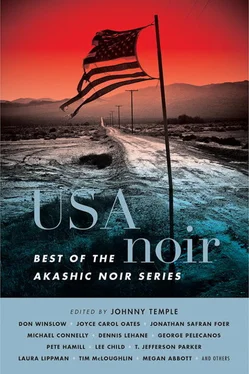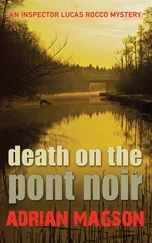Johnny Temple - USA Noir - Best of the Akashic Noir Series
Здесь есть возможность читать онлайн «Johnny Temple - USA Noir - Best of the Akashic Noir Series» весь текст электронной книги совершенно бесплатно (целиком полную версию без сокращений). В некоторых случаях можно слушать аудио, скачать через торрент в формате fb2 и присутствует краткое содержание. Город: New York, Год выпуска: 2013, ISBN: 2013, Издательство: Akashic Books, Жанр: Триллер, Детектив, на английском языке. Описание произведения, (предисловие) а так же отзывы посетителей доступны на портале библиотеки ЛибКат.
- Название:USA Noir: Best of the Akashic Noir Series
- Автор:
- Издательство:Akashic Books
- Жанр:
- Год:2013
- Город:New York
- ISBN:978-1-61775-189-9
- Рейтинг книги:3 / 5. Голосов: 1
-
Избранное:Добавить в избранное
- Отзывы:
-
Ваша оценка:
- 60
- 1
- 2
- 3
- 4
- 5
USA Noir: Best of the Akashic Noir Series: краткое содержание, описание и аннотация
Предлагаем к чтению аннотацию, описание, краткое содержание или предисловие (зависит от того, что написал сам автор книги «USA Noir: Best of the Akashic Noir Series»). Если вы не нашли необходимую информацию о книге — напишите в комментариях, мы постараемся отыскать её.
USA Noir: Best of the Akashic Noir Series — читать онлайн бесплатно полную книгу (весь текст) целиком
Ниже представлен текст книги, разбитый по страницам. Система сохранения места последней прочитанной страницы, позволяет с удобством читать онлайн бесплатно книгу «USA Noir: Best of the Akashic Noir Series», без необходимости каждый раз заново искать на чём Вы остановились. Поставьте закладку, и сможете в любой момент перейти на страницу, на которой закончили чтение.
Интервал:
Закладка:
And I’m glad now that I put in the wine cellar. Makes it less likely that the new owner will want to dig out the basement. Which means there’s less chance of a collapse, and less likelihood that they’ll ever find that little bag of bones in the hearth.
THE ROSE RED VIAL
by Pir Rothenberg
When I got inside I called her name. My house was dark and quiet, and although nothing appeared altered I felt that something had happened since I’d left for the museum’s summer gala. There was a note on the kitchen table. I scanned it and it made no sense. I stuffed it into my pocket, took back a shot of whiskey, and walked the narrow hallway into the living room. I thought of the note; the words were going to make sense in a moment. I was sure of it, and felt so much like a balloon steadily expanding that I held my breath and winced at the inevitable explosion.
One month prior, in a storage room below the Virginia Historical Society, I sat before an empty glass cabinet preparing the lamps I would mount on the shelves. There were to be six items of Edgar Allan Poe memorabilia here, among them a lock of dark hair taken off the poet’s head after his death; the key to the trunk that accompanied Poe to Baltimore, where he spent the final few days of his life; and a walking stick, which Poe left here in Richmond ten days before his death. The items were on loan from the Poe Museum across town for the city’s celebration of the poet’s bicentennial, as yet seven months away.
I took a pull from the small metal flask I kept in my utility belt. When I noticed I wasn’t alone, it was too late to hide it. It was the new intern, a dark-haired girl with a small scar across her lower lip.
“Sorry,” she said. “Didn’t mean to scare you.”
“You didn’t,” I said, and took another swig before recapping the flask.
She’d started at the museum on Monday, but I’d seen her the weekend before in my neighbors’ backyard. The Hamlins had installed a six-foot privacy fence years ago, but by the unobstructed view from an upstairs window I’d watched the young woman standing like the very portrait of boredom, hand on the flare of her hip, as Barb Hamlin pointed out the trained wisteria and the touch-me-nots in her garden. She’d had one leg stretched into a band of sunlight when she glanced up and noticed me.
I went back to work on the lamps. “They give you something to do in here?”
“Rebecca,” she said, strolling through the makeshift aisles of cases and boxes. Her dark hair fell in angles around her face and she wore a white summer dress unsuitable for an intern’s duties. “And I wish they would . This room is why I’m here.”
“Poe fan, huh?”
“You too,” she said. “Or so Uncle Lou tells me.”
I chuckled softly but did not look up. I was well acquainted with “Uncle Lou,” former captain of the 3rd Precinct, famous for his supposed paternal brand of policing. Really, he’d never been more than a squat old tyrant. We’d been neighbors for a decade and the only thing that kept our peace was that six-foot fence. Now I was humbled to learn that “Uncle” was not a total misnomer; Lou, who’d sired no offspring, had a pretty young niece from Cincinnati.
“Maybe you could ask them to give me an assignment back here,” Rebecca said.
I told her I was just a lighting technician, contracted, not even staff.
“But you know John,” she said. John was the head curator. “You two are friends.”
I thought she ought to ask Lou, a patron of the museum whose connections had likely procured her the internship in the first place. But I agreed to put in a word, if only to end the conversation: nothing good could come from associating with Hamlin kin—much less from upsetting one with a refusal. Yet it excited me too, the thought of Lou’s scowling displeasure were he to discover Rebecca and I chumming around at the museum. Displeasure was a euphemism; he’d put his wife’s garden shears through my skull.
Still, when she asked for a drink, I handed her the flask.
At sunset she was at my front door. I glanced toward Lou and Barb’s house. Rebecca told me not to worry, they’d gone to play bridge with friends.
“So,” she said, wandering into my living room, “do you have any first editions?”
“What?”
“Of Poe,” she said.
“Did your uncle tell you that too?”
Glancing into corners, trailing her fingers along windowsills, she smiled. “I was hoping that a Poe aficionado—who works in a museum, no less—would have an artifact lying around.”
“What,” I said, “just lying around like junk mail?”
“Don’t be nasty,” she said, then picked up a green glass ashtray. “Like this,” she said, holding it to the light. “It’d be great if you could say, ‘And this is Poe’s ashtray, recovered from his writing desk at his last residence at Fordham.’”
“That was my grandfather’s.”
She set it down. “Lou would like that. History buff.”
Yeah, I thought. He had a hard time letting go of it.
“All sorts of Civil War memorabilia everywhere. Ever been inside?”
This was beginning to feel like a game. “What do you think?”
“How should I know where you’ve been?”
I told her she’d better not let Lou see us together.
“Together?” she said, hiding a smile.
“You know what I mean.”
“Why, doesn’t he like you?”
Now I just sat back and looked at her.
“Oh, I know ,” she said, grinning. “He told me to stay away from you.”
Then she asked for a drink, even though, by the way she’d cringed earlier, I could tell she’d hated it. I was disappointed. She was only there with me for a little rebellion against the stuffy uncle and aunt.
So be it. I went to get the whiskey.
I spoke with John. I owed my job at the VHS—my very livelihood in this city—solely to him. By the end of the week Rebecca was putting in shifts assisting me in preparing the illumination of over 1,500 objects for the bicentennial exhibits. John and the staff unpacked items every day and created layout plans. It was my job to determine how best to light those books, paintings, and curios they wanted in cases, mounted upon walls, or perched on podiums. Rebecca was happy the hour or two a day she worked with me—rather, with the objects, to which her full attention was devoted. She was ecstatic watching the items emerge from their boxes, or gazing into the cases once the lighting was complete, all the pieces illuminated perfectly before they went back into their boxes for safekeeping. The lights from the displays would strike her face full on, or under her chin like a flashlight beam, or sidelong as in a Rembrandt painting. I wanted to pose her and arrange the light so as to expose every molecule of her simple beauty.
On my back, my head inside a case, I heard Rebecca gasp.
“Wow,” she called, “have you seen this?”
When I stood up Rebecca was crouched by a case that John and I’d worked on that morning and had yet to finalize. She moved aside and looked at me, leaving one finger pressed to the glass.
“The perfume?” I said.
It was a small red vial, chipped along the lip—like Rebecca, with that nick running the width of her own. The original cork stopper, disintegrated long ago, had been replaced by a plastic facsimile.
Rebecca read from the placard: “ The essence of rose, believed given by Poe to Virginia the year of their marriage, 1836. ” She looked to me again, this time with a lusty sort of gaze. “Can you open the case?”
Читать дальшеИнтервал:
Закладка:
Похожие книги на «USA Noir: Best of the Akashic Noir Series»
Представляем Вашему вниманию похожие книги на «USA Noir: Best of the Akashic Noir Series» списком для выбора. Мы отобрали схожую по названию и смыслу литературу в надежде предоставить читателям больше вариантов отыскать новые, интересные, ещё непрочитанные произведения.
Обсуждение, отзывы о книге «USA Noir: Best of the Akashic Noir Series» и просто собственные мнения читателей. Оставьте ваши комментарии, напишите, что Вы думаете о произведении, его смысле или главных героях. Укажите что конкретно понравилось, а что нет, и почему Вы так считаете.












